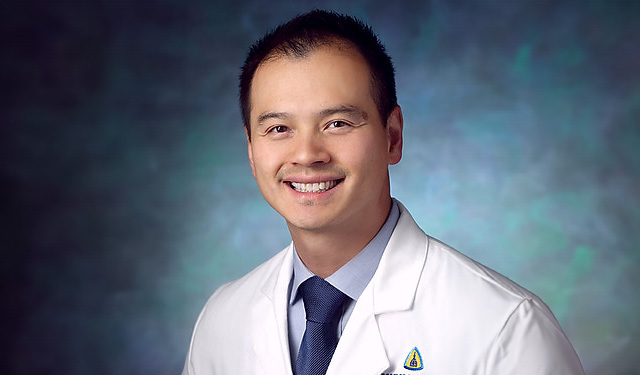You're Bugging Me
The Role of the Microbiome in Fighting Esophageal Cancer

Cynthia Sears, M.D.
What role do the germs in our gut play in esophageal cancer? Under the mentorship of leading microbiome expert, Cynthia Sears, M.D., and in collaboration with Valsamo “Elsa” Anagnostou, M.D., Ph.D., Kellie Smith, Ph.D., and Liz Thompson, M.D., Ph.D., of the Bloomberg~Kimmel Institute for Cancer Immunotherapy, Fyza Shaikh is working to figure it out.
The microbiome—the microscopic society of organisms in our gut, including hundreds of species of bacteria—aid in digestion, metabolism, and immunity. Dr. Shaikh and collaborators want to learn how these bugs might create environments conducive to the development of cancer and also how they may interfere with treatments that fight cancer, particularly immunotherapy with a class of drugs called checkpoint inhibitors. Cancer cells exploit immune checkpoints to shut down the immune response to cancer, and checkpoint inhibitors reactivate the immune response.
Piggybacking on a clinical trial of immunotherapy before chemotherapy, radiation therapy and surgery for esophageal cancer, Dr. Shaikh worked with study leader Vincent Lam, M.D., to collect samples from patients, including stool, tumor DNA, and normal DNA, to get a picture of the microbiome.
Dr. Shaikh is not interested in the DNA of the cancer cells and immune cells as much cancer research is focused on but rather the DNA of bacteria. Using a special technology, she is able to selectively extract and study the DNA of bacteria she finds. She is particularly interested in the microbiome of patients who obtain what is known as a complete pathologic response from immunotherapy, meaning at the time of surgery, there was no tumor remaining. The immunotherapy essentially cured the cancer.
“Looking at the microbiome, we found that those who had a complete pathologic response had a different profile than people with residual tumors,” says Dr. Shaikh. There was something different in the microbiome of those who responded well to the immunotherapy. “It was surprising to us. This was a small study of 18 people, so we really didn’t expect to see anything going into it. This strong signal was exciting.”
She cautions, however, that the work is early. Researchers will need to differentiate the species of bacteria found in samples from patients and confirm what they found was not by chance.
“We are going back to the laboratory and looking at more models to confirm what we found in the small study,” says Dr. Shaikh. “No one really knows what the esophageal microbiome looks like. There is not much data on what bacteria are there. We are among the first to study this.”





The Microbiome and its impact on the immune response is a new field of study in cancer with the first basic research studies published in 2015 followed by human studies in 2017 and 2018, she says.
“An incredible amount of work has been done, but we really are just getting started on this important story,” says Dr. Shaikh.
A biorepository of patient samples established at the Bloomberg~Kimmel Institute for Cancer Immunotherapy is key to her ongoing research. Drs. Sears, Shaikh and colleagues are using these samples to study the bacteria and develop the methodology and computational methods needed to distinguish good bacteria from harmful, cancer-promoting bacteria.
The biorepository, she says, is essential to pushing this fledgling field forward. Funding is another critical factor. She leveraged this research to earn a prestigious [Fyza, tell me the name of the grant again] to look for biomarkers that will predict response to treatment. Looking at the metabolites—the microscopic artifacts of bacterial activity--found in the microbiome of cancer patients, she can begin to classify bugs that support treatment and those that work against its success.
The range of bacteria is vast, and there is a lot of redundancy, but perhaps similarity in metabolites of different bacteria could be a predictor of response to immunotherapy, she says.
Interventional studies are another goal but finding funding for them has been a challenge. She’d like to study the effect of things like fiber supplements, yogurt, and probiotics in cancer patients to determine if their impact on patients’ microbiome is helpful or detrimental to response to cancer therapies.
There are many ways to modify the microbiome, including new biotherapeutic drugs—oral medications containing small groups of bugs—dietary modifications and more, Dr. Shaikh explains. The question is can we use them, and also develop new ways, to enhance the microbiome and create an environment that supports response to immunotherapy with checkpoint inhibitors.
“If we can get more patients to that complete pathologic response, how amazing would that be?” says Dr. Shaikh. “I think the microbiome is an incredible tool we are just beginning to understand. There is so much opportunity.”
